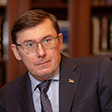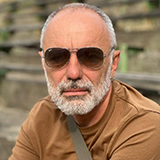The Economist про Україну
Ukraine and the European Union
No half-time oranges for Viktor
Viktor Yanukovych's mistreatment of Yulia Tymoshenko symbolises a rotten rule that Europe can no longer ignore
May 5th 2012 | KIEV | The Economist
Damsel in distress
THE hulking Olimpiysky Stadium in Kiev, renovated at a cost of almost $600m and reopened last year, was a monument to Ukraine's integration with Europe. It will host the final of this summer's Euro 2012 football championship. But it is not clear how many European leaders will be there to toast the Ukrainian president, Viktor Yanukovych, and whether the tournament will be a symbol of Ukraine's proximity to Europe or its isolation.
Photographs of Yulia Tymoshenko, a jailed former Ukrainian prime minister (and, during the 2004 Orange revolution, one of Mr Yanukovych's two bitter rivals) show her with bruises that she claims were inflicted by prison guards. She has now gone on hunger strike. The European Commission president, José Manuel Barroso, has said he will not travel to Ukraine for Euro 2012. Other leaders, reportedly including Angela Merkel, the German chancellor, are reluctant. A clutch of European presidents, including Germany's Joachim Gauck, have withdrawn from a summit in Yalta on May 11th and 12th. The 20-year-old project of pulling Ukraine closer to Europe is in deep trouble.
Relations between Mr Yanukovych and the European Union have been souring for months, especially since Ms Tymoshenko was sentenced to seven years in prison last October for abuse of office. The verdict froze progress on an association agreement and free-trade zone with the EU that would offer what James Sherr, a Ukraine specialist at Chatham House in Britain, calls "all the benefits of membership-lite." That is something a creaking economy badly needs.
The Ukrainians still want a deal. But the EU has made clear that it cannot take effect with Ms Tymoshenko in jail. EU officials are shocked that she is now the apparent victim of violence; she, however, has used it to climb back on to the political stage. After her loss to Mr Yanukovych in the presidential election of February 2010, her star was on the wane. But her imprisonment and hunger strike have revived her image as a resistance princess and discredited Mr Yanukovych, not just with the EU but with many of his erstwhile supporters.
The power and no glory
What explains Mr Yanukovych's counterproductive persecution of Ms Tymoshenko? In part, he is afraid. As he sees it, Ms Tymoshenko spoilt the presidencies of both Leonid Kuchma, in office between 1994 and 2005, and her one-time Orange colleague, Viktor Yushchenko, and he is loth to let her bring him down too. Yet such paranoia "exaggerates her power and popularity," according to Mykola Riabchuk at the Ukrainian Centre for Cultural Studies, who says Mr Yanukovych is pursuing "mafia-style revenge." This mentality reflects the political culture of the Donbass, the Russian-speaking industrial region around Donetsk, in eastern Ukraine, Mr Yanukovych's home base.
Even more than the imprisonment of Ms Tymoshenko, it is the import of this culture to the capital that has sparked discontent with the Yanukovych government. Since he took power, he has pushed through a new constitution to strengthen the presidency, delayed local elections until his Party of the Regions could consolidate its grip, and pursued prosecutions against political rivals, of whom Ms Tymoshenko is just one.
Most sharply, corruption and cronyism have reached a new intensity. Mr Yanukovych, who has never worked in the private sector, lives on an estate outside Kiev valued at $10m (Mr Yushchenko, who long since fell out with Ms Tymoshenko, is still in the presidential palace). Few have done as well as "the Family" led by Mr Yanukovych and his two sons, the oldest of whom, Oleksandr, is a dentist whose estimated $99m fortune catapulted him into this year's Forbes list of the richest Ukrainians. This group has appointed loyalists to the central bank and finance ministry, and put forward new chiefs for the security service and defence ministry-signs that Mr Yanukovych wants an independent power base beyond the oligarchs who back him now.
A partial boycott of Euro 2012 may be too late. Throughout 2010 and 2011, as Mr Yanukovych consolidated his power, the EU stayed mum, either out of boredom with Ukraine's endless problems or out of hope that bringing Ukraine closer would moderate Mr Yanukovych. That lack of action, says Olexiy Haran of the Kyiv Mohyla University, was seen by Mr Yanukovych as "carte blanche that he could do what he wants." Andrew Wilson, an analyst at the European Council on Foreign Relations, concurs: "Yanukovych took full advantage of Ukraine fatigue."
Now Ukrainian officials are crying double standards. Renat Kuzmin, Ukraine's first deputy prosecutor-general, criticises what he calls "political judgments that have nothing to do with justice." The Yanukovych regime is telling Ukrainians that Europe was never serious about closer relations, and that its concerns about human rights and Ms Tymoshenko are just pretexts for it to shun the country.
Not all is lost. Ukraine's political culture, and its press, remain vibrant and unpredictable. The next big test will come in October, when Ukraine is due to hold parliamentary elections. Two opposition parties-Ms Tymoshenko's Batkivshchyna and Arseniy Yatsenyuk's Front for Change-have said they will run as a united block. A Razumkov Centre poll puts their support at nearly 27%, against 23% for the Party of the Regions. Mr Yanukovych may find himself faced with a dilemma: does he act against his political instincts and allow his party to lose seats, or does he double up on his Donbass style and move the country one step further towards Belarus-like isolation?
Ukraine and Europe
Call foul
Viktor Yanukovych's thuggish autocracy is heading in a dangerous direction
May 5th 2012 | The Economist
HE WON fairly in February 2010. But since his election Ukraine's president, Viktor Yanukovych, has mauled his country's fragile democracy and weak institutions. He has bullied the media, tampered with the judiciary, exercised arbitrary power and presided over an upsurge of corruption. To see how badly he has gone wrong, consider the show trial, imprisonment and maltreatment of Yulia Tymoshenko, his losing opponent in 2010, who is now on hunger strike.
Mr Yanukovych had no real reason to fear Ms Tymoshenko (pictured). She is no angel, and lost much of her popularity after the 2004 "orange revolution" for her erratic style and questionable business dealings. But he chose to persecute her all the same, adding fresh charges to keep her in prison for longer (see article). He has done this despite a clear message from the European Union that her release is a condition for implementing a much-delayed association agreement, which would open EU markets to Ukrainian exports.
In some ways Mr Yanukovych is using similar tactics to those of his autocratic neighbour, Alyaksandr Lukashenka, in Belarus. He has flirted alternately with Europe and Russia, in the hope of extracting concessions from both, yet yielding nothing serious to either. He wants the association agreement and he needs Western support for another IMF bail-out this summer. Should he get neither, he may turn to Moscow for help-which he would get only with unpleasant conditions.
This probably will not end well for Ukraine. The unfortunate Ukrainians find themselves not only at the mercy of their predatory ruler but also cut off from Europe. And it creates a headache for the West. The fear is that Mr Yanukovych could allow his country to fall under Russia's sway. Vladimir Putin, who will be inaugurated as Russia's president on May 7th, is pressing Ukraine to join a post-Soviet customs union instead of pursuing its EU deal. The Russians also want to control Ukraine's gas-transit network, as they do Belarus's. Such a setback for 20 years of Western efforts to bolster Ukraine's independence is a grim prospect; EU countries should make clear to Mr Putin that it would damage relations with Russia.
Brickbats and beetroots
Fears of Russian influence must not be allowed to dictate a soft response to Mr Yanukovych's autocratic ways. He tends to treat friendliness as weakness, pocketing the proceeds. Instead, the EU should tighten the screws on the president and his Donetsk business associates-while also finding ways to hold out hope to ordinary Ukrainians.
High-level political boycotts are a good place to start. Several heads of state, including those of Germany and the Czech Republic, are rightly refusing to attend an east European summit with Mr Yanukovych that begins in Yalta on May 11th. The EU's political leaders (but not its soccer teams) should also boycott matches in Ukraine during the Euro 2012 football championships, which it is jointly hosting with Poland.
Off the pitch, the EU should press for fair parliamentary elections in October, sending as many observers as it can. Financial supervisors must apply money-laundering laws stringently to the huge sums flowing out of Ukraine to Austria, Britain, Cyprus and elsewhere. EU countries should withhold visas from those directly involved in the abuse of power. Yet at the same time they ought to make it easier for other Ukrainians to visit the West for study, trade and tourism. And they should do more to explain to Ukrainians the potential benefits of their association agreement, including the possibility that it might ultimately lead to EU membership. The West's quarrel with Ukraine is with its president, not with its people.






